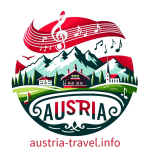Navigating the Linguistic Landscape of Austria: A Guide for Tourists
Austria, known for its rich cultural heritage and breathtaking landscapes, offers an intriguing linguistic landscape that is both familiar and unique to visitors. Here's an insightful article for tourists exploring the language in Austria:
Welcome to Austria, a land where history, culture, and language intertwine to create a truly unique experience. As a tourist, understanding the linguistic aspects of Austria can enhance your journey, offering deeper insights into the country's heritage and daily life.
Official Language: German
The official language of Austria is German, but it's distinct from the German spoken in Germany. Austrian German has its own vocabulary, pronunciation, and even some grammatical differences. For instance, Austrians often use the word "Jänner" instead of "Januar" for January. Don't worry if you're already familiar with standard German; you'll be understood, but expect to encounter local variations and idioms.
Regional Dialects: A Rich Tapestry
Austria is home to a variety of dialects, primarily Bavarian and Alemannic groups. Each region, from Tyrol to Vorarlberg, has its unique twist on the language. In rural areas, dialects can be quite strong, presenting a charming challenge to visitors. In cities like Vienna, Salzburg, and Graz, the language is more standard, but with a local flavor.
English Proficiency: A Tourist's Friend
English is widely spoken, especially in tourist areas, major cities, and among the younger population. Most Austrians working in the tourism sector speak English, so you can usually get by without speaking German. However, learning a few basic phrases in German can go a long way in showing respect for the local culture.
Learning Local Phrases: Connect with Culture
Simple phrases like "Grüß Gott" (a common greeting), "Danke" (thank you), and "Entschuldigung" (excuse me) are helpful. Also, familiarize yourself with local food terms, as Austria is known for its cuisine. Knowing how to order a "Wiener Schnitzel" or "Apfelstrudel" can be both fun and rewarding.
Signage and Public Information
Most public signs and information are in German, but in tourist areas, English translations are often provided. Train stations, airports, and public transport systems usually offer multilingual information.
Embrace the Local Tongue: Cultural Immersion
Try to immerse yourself in the language. Listen to local music, watch Austrian films or TV shows with subtitles, and don't hesitate to practice speaking with locals. Austrians generally appreciate the effort, even if your German isn't perfect.
Conclusion
Austria's linguistic landscape is a delightful part of your travel experience. Embracing the language, even in small ways, can enrich your understanding and enjoyment of this beautiful country. Whether you're navigating the cobbled streets of ancient towns or exploring the alpine vistas, a little linguistic knowledge goes a long way.
